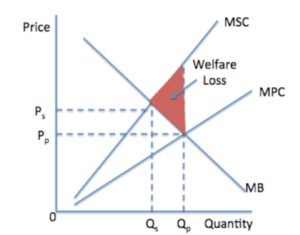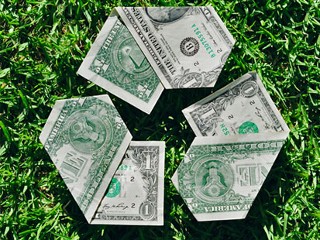ECONOMICS SAYS RECYCLING IS BAD! OR DOES IT? – Mr Terry
Recycling is bad – that was the general gist of my last article. Indeed, that does hold true in a certain set of circumstances. If we look at today, right here and now much recycling actually makes society worse off, it takes food from our plates and money from our pockets. That is because for some types of recycling it is more efficient to create new rather than recycle old. To get technical on you the Marginal Social Cost of recycling is bigger than the Marginal Social Benefit leading to a Deadweight Welfare Loss to Society!

Don’t worry about the diagram unless you decide to study Economics, but basically the shaded area represents how much society is worse off due to recycling and indicates that less recycling should take place.
However, (which is a very important word in Economics), that is not the full picture. My previous post focused on the short-term situation, but we also need to consider the long-run implications which certainly changes things. Economics is the study of the fundamental economic problem which is that resources are scarce but wants are unlimited. This perhaps gives you a clue to the way the argument will be going. If we could have everything we wanted and resources were not scarce, i.e. limited, then Economics would not exist as the problem that Economics tries to deal with wouldn’t be a problem!
However, resources are scarce and one day many of them will run out. This is why in Economics we need to look at both the short and long-runs to understand the full picture. Maynard Keynes said that in the long-run we are all dead, he wasn’t actually referring to the environmental debate but the phrase is apt. Although, recycling can be argued to be bad now, in the long-run that is not the case when the world faces an ever greater shortage of natural resources. The argument goes that we need to stop being short-sighted and do all we can to preserve the limited resources that we have now for the benefit of future generations. If we hinder the development of the recycling industry now, just because some parts of it are not economically efficient then we will never create the ability to use our limited resources more effectively in the future when we really need to do so.
New, small industries are very often less efficient than large established industries. Large industry has the ability to benefit from economies of scale (the cost benefits of producing on a large scale) and have generated dynamic efficiency which means that they have developed better and more efficient production techniques over time, dramatically reducing the cost of production in the industry.
If we stop recycling now, the industry will never develop these characteristics and never reach the point where the cost to society of recycling is lower than the benefit to society, thus making society better off. So, it may be economically inefficient to recycle now, but recycling has a huge part to play in maintaining economic development in the future. Our natural resources will not last for ever and unless we embrace things like recycling and sustainable production we are indeed all dead!
To get technical on you again, if we do not recycle in the short-run we are suffering from the problems of asymmetric information leading to consumer, producer and political myopia causing long-run market and government failure!!! Sorry – economists can never resist saying a simple thing in a really complicated way!!!















1 comment